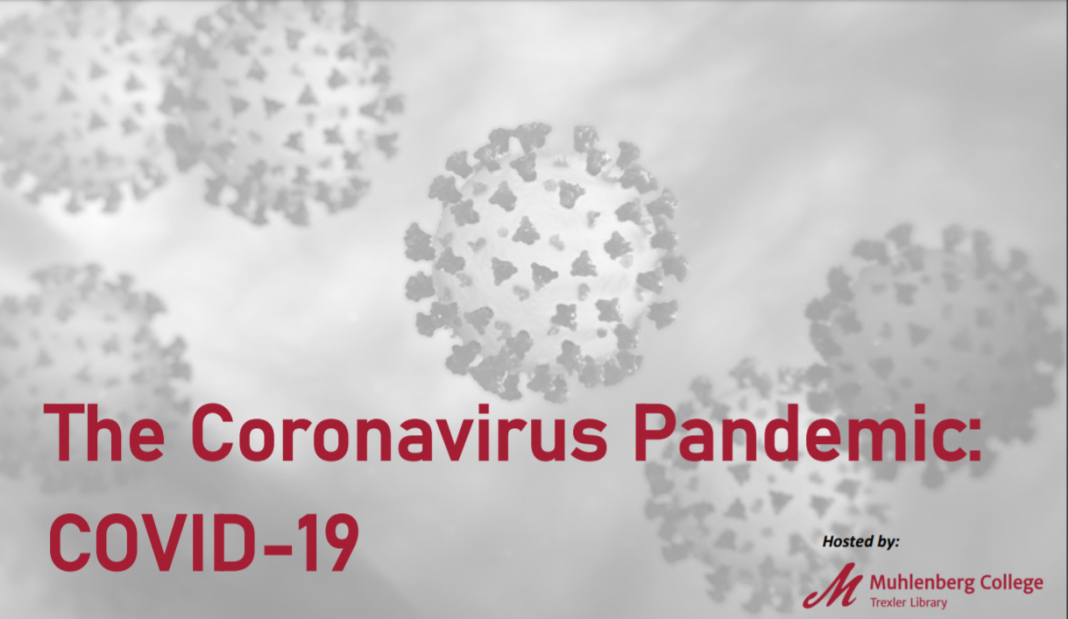In an effort to quell the panic and confusion surrounding the novel coronavirus, COVID-19, Muhlenberg held a panel forum on Tuesday, Mar. 10 with a few professors from the Public Health, Economics, and Anthropology departments, as well as a member of the research assistance team in the Trexler Library. The College has since announced that after Mar. 13, classes will move online until April 13, and all students are instructed to move out by Saturday, Mar. 14 at 2 p.m. unless extenuating circumstances are present.
The panel opened with speaker Chrysan Cronin, a Public Health professor. Cronin detailed what is known of COVID-19. The virus was first discovered in the Hubei province of Wuhan, China in late December of 2019. At this time, it is known that this virus was first carried in animals (at this time it is unknown what kind of animal was responsible for this transmission, though bats are a suspect) and was eventually transferred to a human carrier.
Delving deeper into what is known thus far, Cronin went on to detail the symptoms, treatments and specifics of COVID-19. In a mild or early case of the virus, people may experience cold-like symptoms; later on (and in more severe cases), fatigue, shortness of breath, and dry cough are to be expected. While the virus has been gene sequenced and can thus be tested for, there is still no cure. Rather, treatment is palliative, and one can treat the symptoms, but not the underlying illness. This illness is highly contagious, being spread via respiratory droplets, be they airborne or living on common surfaces. Thus, “social distancing” of 3-6 feet is recommended for the foreseeable future, as even those who appear well, may be in the incubation period of the virus, or asymptomatic carriers.
Professor Casey Miller of the Anthropology department detailed the social sphere surrounding the novel coronavirus, and that which allowed the virus to spread rapidly and cause division in a time where unity is needed. Miller explained that in China, the authoritarian government can lead to lower level officials being too intimidated to report bad news to their superiors, leading to cover ups, and failed attempts to alleviate the situation. However, once the higher levels of the Chinese government learned of the virus, the authoritarian government style proved deeply beneficial; allowing citizens to quickly pool resources, volunteer to provide relief and construct a hospital in just 10 days.
In comparison to China, the US is finding difficulty in uniting against the illness. Miller said, “Despite seemingly very different cultural circumstances and also very different political structures and systems, I would posit that the initial response of the Trump administration has actually been very similar to that of China’s authoritarian government and the way that they responded to the disease.” However, Miller does admit that the US has been “very slow to respond to the disease and to scale up testing.” Miller goes on to explain that recent tax breaks on the wealthy have led to a decrease in public health funds, resulting in less funding for both organizations like the CDC and for testing kits, of which there is a current shortage.
Unfortunately, this shortage has also been suspected to under-assess the number of cases of the virus. To test for COVID-19, two tests are administered to each suspected carrier, each consisting of a throat swab which is then screened for the virus. Due to the shortage and cost of testing, those presenting what could be mild cases of the virus are often diagnosed with a common cold and are refused testing. Health officials are now becoming more aggressive in their efforts against the coronavirus and increasing the amounts of tests they administer.
Scientists are continually adamant about the risks of this virus and assert that the public does need to be careful; in recognizing the risk, Cronin said that public health is everyone’s responsibility. However, some are still ignoring scientists and instead are following in suit of President Donald Trump. Miller said of the Trump administration’s perspective, “[Trump says] that the disease will miraculously disappear when the weather warms up, that the vaccine will be ready in a few months. That infected people should keep going to work if they have minimal symptoms. He’s called COVID-19 a Democratic hoax. He’s said that the tests are beautiful and perfect, like the Ukraine phone call and so on and so forth.”
Regardless of political belief or otherwise, this is a public health breach. Wash your hands and even if you think you are safe, think of those who are not; the un(der)insured, the poor, those chronically ill or immunodeficient and those who fear visiting the hospital, such as undocumented immigrants. If you suspect that you may have the virus, call a local healthcare provider (primary care physician or hospital) prior to visiting, and get checked out.






















